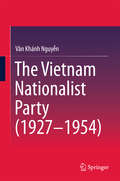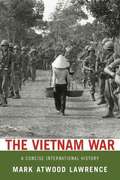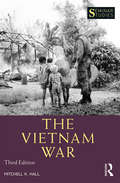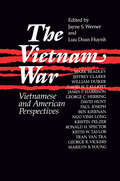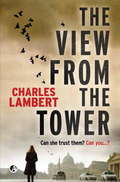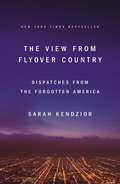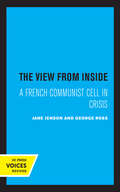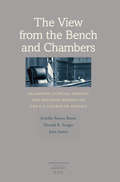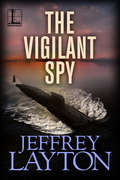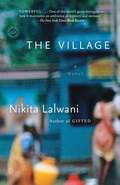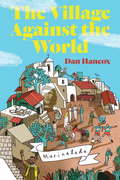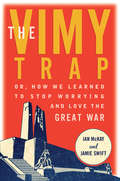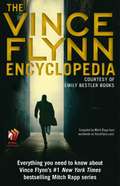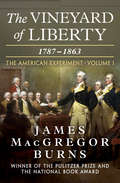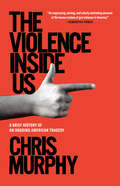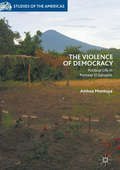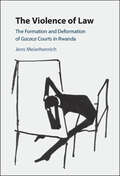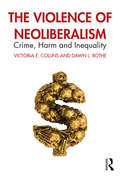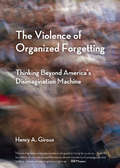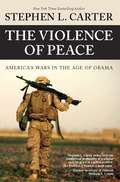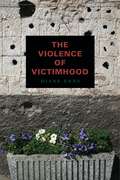- Table View
- List View
The Vietnam Nationalist Party (1927-1954)
by Văn Khánh NguyễnThis book presents research focusing on the Vietnam Nationalist Party (Viá»++t Nam Quá»'c dân Ä'ảng) from 1927 to 1954. It elaborates on the party's establishment, political ideology and organizational structure, the Yen Bai Uprising, the party's downfall, and its role in the Vietnamese Revolution. Findings are presented systematically and comprehensively, relying on official and unofficial, as well as domestic and foreign sources, including texts from localities and hometowns of vital figures in the organization. The author compares, contrasts and evaluates this complex collection of documents based on the theoretical perspectives of conflict theory, social system theory, social structuralism and functionism, dialectic materialism and Marxist theory. It is essential reading for Vietnamese and international researchers interested in Vietnam's political context in the early twentieth century and for undergraduate and postgraduate programs in Vietnam's history and politics.
The Vietnam War: A Concise International History
by Mark Atwood LawrenceThe Vietnam War remains a topic of extraordinary interest, not least because of striking parallels between that conflict and more recent fighting in the Middle East. InThe Vietnam War, Mark Atwood Lawrence draws upon the latest research in archives around the world to offer readers a superb account of a key moment in U.S. as well as global history. <p><p> While focusing on American involvement between 1965 and 1975, Lawrence offers an unprecedentedly complete picture of all sides of the war, notably by examining the motives that drove the Vietnamese communists and their foreign allies. Moreover, the book carefully considers both the long- and short-term origins of the war. Lawrence examines the rise of Vietnamese communism in the early twentieth century and reveals how Cold War anxieties of the 1940s and 1950s set the United States on the road to intervention. Of course, the heart of the book covers the "American war," ranging from the overthrow of South Vietnamese President Ngo Dinh Diem to the impact of the Tet Offensive on American public opinion, Lyndon Johnson's withdrawal from the 1968 presidential race, Richard Nixon's expansion of the war into Cambodia and Laos, and the problematic peace agreement of 1973, which ended American military involvement. Finally, the book explores the complex aftermath of the war--its enduring legacy in American books, film, and political debate, as well as Vietnam's struggles with severe social and economic problems. <p> A compact and authoritative primer on an intensely relevant topic, this well-researched and engaging volume offers an invaluable overview of the Vietnam War.
The Vietnam War: Revised 2nd Edition (Seminar Studies)
by Mitchell HallThe Vietnam War examines this conflict from its origins up until North Vietnam’s victory in 1975. Historian Mitchell K. Hall’s lucid account is an ideal introduction to the key debates surrounding a war that remains controversial and disputed in American scholarship and collective memory. The new edition has been fully updated and expanded to include additional material on the preceding French Indochina War, the American antiwar movement, North Vietnamese perspectives and motivations, and the postwar scholarly debate. The text is supported by a documents section and a wide range of study tools, including a timeline of events, glossaries of key figures and terms, and a rich "further reading" section accompanied by a new bibliographical essay. Concise yet comprehensive, The Vietnam War remains the most accessible and stimulating introduction to this crucial 20th-century conflict.
The Vietnam War: Vietnamese and American Perspectives (The\lessons Of The Vietnam War Ser.)
by Jayne Werner Luu Doan HuynhThis volume derives from an unprecedented seminar held at Columbia University's School of International and Public Affairs in November 1990. At the seminar, leading Western diplomatic and military historians and Vietnam scholars met with prominent Vietnamese Communists to reflect on the Vietnam War. The book contains four parts: The Vietnamese Revolution and Political/Military strategy; the war from the American side; the war in the South and Cambodia; and retrospective and postwar issues. In addition to Jane Werner and Luu Doan Huynh, the contributors are Mark Bradley, William Duiker, David Elliott, Christine White, George Vickers, James Harrison, George Herring, Ronald Spector, Paul Joseph, Jeffrey Clarke, Ngo Vinh Long, Benedict Kiernan, Marilyn Young, Keith Taylor, and Tran Van Tra. General Tra was Commander of the People's Liberation Armed Forces of South Vietnam from 1963 to 1975. His eye-opening analysis of the Tet Offensive has never before been available in English.
The View From The Tower
by Charles LambertComparable to The Girl Who Fell From the Sky by Simon Mawer and Ordinary Thunderstorms by William Boyd. Media and online promotion, including advertisements online and in print, and promoted through our street team of bloggers and reviewers, the Witness Protection Program. Physical ARCS available, and digital ARCs issued through NetGalley. Co-promotion with The Friday Project at HarperCollins, who will be publishing a non-fiction title by the author at the same time.
The View From the Corner Shop: The Diary of a Yorkshire Shop Assistant in Wartime
by Kathleen HeyKathleen Hey spent the war years helping her sister and brother-in-law run a grocery shop in the Yorkshire town of Dewsbury. From July 1941 to July 1946 she kept a diary for the Mass-Observation project, recording the thoughts and concerns of the people who used the shop. What makes Kathleen's account such a vivid and compelling read is the immediacy of her writing. People were pulling together on the surface ('Bert has painted the V-sign on the shop door…', she writes) but there are plenty of tensions underneath. The shortage of food and the extreme difficulty of obtaining it is a constant thread, which dominates conversation in the town, more so even than the danger of bombardment and the war itself. Sometimes events take a comic turn. A lack of onions provokes outrage among her customers, and Kathleen writes, 'I believe they think we have secret onion orgies at night and use them all up. ' The Brooke Bond tea rep complains that tea need not be rationed at all if supply ships were not filled with 'useless goods' such as Corn Flakes, and there is a long-running saga about the non-arrival of Smedley's peas. Among the chorus of voices she brings us, Kathleen herself shines through as a strong and engaging woman who refuses to give in to doubts or misery and who maintains her keen sense of humour even under the most trying conditions. A vibrant addition to our records of the Second World War, the power of her diary lies in its juxtaposition of the everyday and the extraordinary, the homely and the universal, small town life and the wartime upheavals of a nation.
The View from Flyover Country: Dispatches from the Forgotten America
by Sarah KendziorFrom the St. Louis–based journalist often credited with first predicting Donald Trump’s presidential victory."A collection of sharp-edged, humanistic pieces about the American heartland...Passionate pieces that repeatedly assail the inability of many to empathize and to humanize." — KirkusIn 2015, Sarah Kendzior collected the essays she reported for Al Jazeera and published them as The View from Flyover Country, which became an ebook bestseller and garnered praise from readers around the world. Now, The View from Flyover Country is being released in print with an updated introduction and epilogue that reflect on the ways that the Trump presidency was the certain result of the realities first captured in Kendzior’s essays.A clear-eyed account of the realities of life in America’s overlooked heartland, The View from Flyover Country is a piercing critique of the labor exploitation, race relations, gentrification, media bias, and other aspects of the post-employment economy that gave rise to a president who rules like an autocrat. The View from Flyover Country is necessary reading for anyone who believes that the only way for America to fix its problems is to first discuss them with honesty and compassion.“Please put everything aside and try to get ahold of Sarah Kendzior’s collected essays, The View from Flyover Country. I have rarely come across writing that is as urgent and beautifully expressed. What makes Kendzior’s writing so truly important is [that] it . . . documents where the problem lies, by somebody who lives there.”—The Wire“Sarah Kendzior is as harsh and tenacious a critic of the Trump administration as you’ll find. She isn’t some new kid on the political block or a controversy machine. . . .Rather she is a widely published journalist and anthropologist who has spent much of her life studying authoritarianism.” —Columbia Tribune
The View from Inside: A French Communist Cell in Crisis
by George Ross Jane JensonThis title is part of UC Press's Voices Revived program, which commemorates University of California Press’s mission to seek out and cultivate the brightest minds and give them voice, reach, and impact. Drawing on a backlist dating to 1893, Voices Revived makes high-quality, peer-reviewed scholarship accessible once again using print-on-demand technology. This title was originally published in 1984.
The View from the Bench and Chambers: Examining Judicial Process and Decision Making on the U.S. Courts of Appeals (Constitutionalism and Democracy)
by Jennifer Barnes Bowie Donald R. Songer John SzmerFor most of their history, the U. S. courts of appeals have toiled in obscurity, well out of the limelight of political controversy. But as the number of appeals has increased dramatically, while the number of cases heard by the Supreme Court has remained the same, the courts of appeals have become the court of last resort for the vast majority of litigants. This enhanced status has been recognized by important political actors, and as a result, appointments to the courts of appeals have become more and more contentious since the 1990s. This combination of increasing political salience and increasing political controversy has led to the rise of serious empirical studies of the role of the courts of appeals in our legal and political system. At once building on and contributing to this wave of scholarship, The View from the Bench and Chambers melds a series of quantitative analyses of judicial decisions with the perspectives gained from in-depth interviews with the judges and their law clerks. This multifaceted approach yields a level of insight beyond that provided by any previous work on appellate courts in the United States, making The View from the Bench and Chambers the most comprehensive and rich account of the operation of these courts to date.
The Vigilant Spy (A Yuri Kirov Thriller #4)
by Jeffrey LaytonOnce a spy . . . Granted asylum by the United States, former Russian naval intelligence officer Yuri Kirov wants nothing more than to live peacefully with his adopted American family. But first the underwater technology expert must pay a price . . . Yuri is drafted by the CIA. His mission: assist U.S. spies with uncovering the secret behind the People&’s Republic of China&’s new weapon system, codename SERPENT. The radical antisubmarine technology erases America&’s advantage in underseas warfare. Amid the turmoil of escalating tension between China and Russia, Yuri&’s team is inserted by a spy sub onto Hainan Island in the South China Sea. The mission spirals out of control, leaving Yuri trapped with a CIA officer and a beautiful, high-ranking Chinese engineer. With PRC forces closing in and war between superpowers about to break out, there is only one avenue of escape left. That route will pit Yuri against China&’s full might and power . . . Praise for the The Good Spy &“An explosive, high-stakes thriller that keeps you guessing.&” —Leo J. Maloney &“The excitement never stops . . . high adventure at its very best.&”—Gayle Lynds &“A page-turner with as much heart as brains.&” —Dana Haynes &“A fast-paced adventure that will take readers on a thrilling journey.&” —Diana Chambers &“Breathless entertainment.&” —Tim Tigner
The Vigilant Spy (A Yuri Kirov Thriller #4)
by Jeffrey LaytonOnce a spy . . . Granted asylum by the United States, former Russian naval intelligence officer Yuri Kirov wants nothing more than to live peacefully with his adopted American family. But first the underwater technology expert must pay a price . . . Yuri is drafted by the CIA. His mission: assist U.S. spies with uncovering the secret behind the People&’s Republic of China&’s new weapon system, codename SERPENT. The radical antisubmarine technology erases America&’s advantage in underseas warfare. Amid the turmoil of escalating tension between China and Russia, Yuri&’s team is inserted by a spy sub onto Hainan Island in the South China Sea. The mission spirals out of control, leaving Yuri trapped with a CIA officer and a beautiful, high-ranking Chinese engineer. With PRC forces closing in and war between superpowers about to break out, there is only one avenue of escape left. That route will pit Yuri against China&’s full might and power . . . Praise for the The Good Spy &“An explosive, high-stakes thriller that keeps you guessing.&” —Leo J. Maloney &“The excitement never stops . . . high adventure at its very best.&”—Gayle Lynds &“A page-turner with as much heart as brains.&” —Dana Haynes &“A fast-paced adventure that will take readers on a thrilling journey.&” —Diana Chambers &“Breathless entertainment.&” —Tim Tigner
The Village
by Nikita LalwaniThe long-awaited follow-up to the critically acclaimed, Booker longlisted Gifted, a provocative novel about an experimental open prison in India and the havoc a team of journalists wreaks on the delicate moral code of the inmates. After a long journey from England, Ray Bhullar arrives early on a winter morning at the gates of a remote Indian village called Ashwer which will be her home for the next three months. The door of the hut she will share with Serena, her English co-worker, is a loose sheet of metal, the windows simple holes in the walls. Beyond the lockless door, village life goes on as usual. And yet, the village is anything but normal. Despite the domestic chores being carried out, cooking, fetching water and sewing and laundering linens, Ashwer is a village of murderers, an experimental open prison. And when Ray and her crew take up residence, to observe and to make a documentary, it seems that they are innocent visitors into a violent world, on a mission to hold the place up to viewers as the ultimate example of tolerance. But the longer Ray and her colleagues stay and their need for drama intensifies, the line between innocence and guilt begins to blur and an unexpected and terrifying new kind of cruelty emerges. A mesmerizing and heartfelt tale of manipulation and personal morality, Nikita Lalwani's new novel brilliantly exposes how truly frail our moral judgment can be.
The Village
by Nikita LalwaniIn her award-winning debut novel, Gifted, Nikita Lalwani crafted a brilliant coming-of-age story that "[called] to mind the work of such novelists as Zadie Smith and Monica Ali" (The Washington Post Book World). Now Lalwani turns her gimlet eye on an extraordinary village in India, and explores the thin boundary between morality and evil, innocence and guilt. After a long trip from London, twenty-seven-year-old BBC filmmaker Ray Bhullar arrives at the remote Indian village of Ashwer, which will be the subject of her newest documentary. From the outside, the town projects a cozy air of domesticity--small huts bordering earthen paths, men lounging and drinking tea, women guiding bright cloth through noisy sewing machines. Yet Ashwer is far from traditional. It is an experimental open prison, a village of convicted murderers and their families. As Ray and her crew settle in, they seek to win the trust of Ashwer's residents and administrators: Nandini, a women's counselor and herself an inmate; Jyoti, a prisoner's wife who is raising her children on the grounds; Sujay, the progressive founder and governor of the society. Ray aims to portray Ashwer as a model of tolerance, yet the longer she and her colleagues stay, the more their need for a dramatic story line intensifies. And as Ray's moral judgment competes with her professional obligation, her assignment takes an uneasy and disturbing turn. Incisive, moving, and superbly written, The Village deftly examines the limits of empathy, the slipperiness of reason, and the strength of our principles in the face of personal gain.Praise for The Village "Powerful . . . One of the novel's great strengths is how it maintains an ambience of mystery and menace."--The New York Times Book Review "Extraordinary . . . Lalwani writes with wonderful clarity and intelligence."--The Times (U.K.) "The Village can creep up and grab you unawares."--Toronto Star "[Lalwani's] prose is evocative and excellent."--Publishers Weekly "Thoughtful and beautifully written."--The Guardian (U.K.) "Gripping."--Marie Claire (U.K.)"Intelligent and disturbing . . . a sharply observed, highly personal book."--Pittsburgh Post-Gazette"A thoughtful novel that envelops us in the oppression and beauty of the rural prison . . . Each voice is distinct, believable and stubborn in its refusal to be easily known. . . . Touchingly evocative."--Financial Times "Thoughtfully and often beautifully written . . . a candid exploration of journalistic ethics."--The ObserverFrom the Hardcover edition.rFrom the Hardcover edition.
The Village Against The World
by Dan HancoxThe land is for those who work it--"La tierra es de quien la trabaja."One hundred kilometers from Seville, there is a small village, Marinaleda, that for the last thirty years has been at the center of a long struggle to create a communist utopia. In a story reminiscent of the Asterix books, Dan Hancox explores the reality behind the community where no one has a mortgage, sport is played in the Che Guevara stadium and there are monthly "Red Sundays" where everyone works together to clean up the neighbourhood. In particular he tells the story of the village mayor, Sánchez Gordillo, who in 2012 became a household name in Spain after leading raids on local supermarkets to feed the Andalucian unemployed.
The Vimy Trap: or, How We Learned To Stop Worrying and Love the Great War
by Jamie Swift Ian McKayThe story of the bloody 1917 Battle of Vimy Ridge is, according to many of today’s tellings, a heroic founding moment for Canada. This noble, birth-of-a-nation narrative is regularly applied to the Great War in general. Yet this mythical tale is rather new. “Vimyism”— today’s official story of glorious, martial patriotism—contrasts sharply with the complex ways in which veterans, artists, clerics, and even politicians who had supported the war interpreted its meaning over the decades. Was the Great War a futile imperial debacle? A proud, nation-building milestone? Contending Great War memories have helped to shape how later wars were imagined. The Vimy Trap provides a powerful probe of commemoration cultures. This subtle, fast-paced work of public history—combining scholarly insight with sharp-eyed journalism, and based on primary sources and school textbooks, battlefield visits and war art—explains both how and why peace and war remain contested terrain in ever-changing landscapes of Canadian memory.
The Vince Flynn Encyclopedia
by Emily Bestler BooksEverything you need to know about Vince Flynn's #1 New York Times bestselling Mitch Rapp series!Hailed as "the king of high-concept political intrigue" (Dan Brown, #1 New York Times bestselling author of The Da Vinci Code), Vince Flynn's covert agent Mitch Rapp took the world by storm in his bestselling series, fighting terrorism and treason both at home and abroad, and captivating the minds of readers all across the world. This comprehensive compilation of characters is the ultimate guidebook to the thrilling and dangerous world of Mitch Rapp. Featuring summaries, memorable quotes, and other fascinating trivia, The Vince Flynn Encyclopedia will tell you everything you need to know about all the characters you love, and the ones you love to hate.
The Vineyard of Liberty, 1787–1863: 1787–1863 (The American Experiment #1)
by James MacGregor BurnsA Pulitzer Prize winner looks at the course of American history from the birth of the Constitution to the dawn of the Civil War. The years between 1787 and 1863 witnessed the development of the American Nation—its society, politics, customs, culture, and, most important, the development of liberty. Burns explores the key events in the republic&’s early decades, as well as the roles of heroes from Washington to Lincoln and of lesser-known figures. Captivating and insightful, Burns&’s history combines the color and texture of early American life with meticulous scholarship. Focusing on the tensions leading up to the Civil War, Burns brilliantly shows how Americans became divided over the meaning of Liberty. Vineyard of Liberty is a sweeping and engrossing narrative of America&’s formative years.
The Violence Inside Us: A Brief History of an Ongoing American Tragedy
by Chris MurphyIs America destined to always be a violent nation? This sweeping history by U.S. senator Chris Murphy explores the origins of our violent impulses, the roots of our obsession with firearms, and the mythologies that prevent us from confronting our national crisis. &“An excellent contribution to our understanding of human lethal aggression and how it can be reduced.&”—Steven Pinker, author of The Better Angels of Our Nature: Why Violence Has Declined In many ways, the United States sets the pace for other nations to follow. Yet on the most important human concern—the need to keep ourselves and our loved ones safe from physical harm—America isn&’t a leader. We are disturbingly laggard. Our churches and schools, our movie theaters and dance clubs, our workplaces and neighborhoods, no longer feel safe. To confront this problem, we must first understand it. In this carefully researched and deeply emotional book, Senator Chris Murphy dissects our country&’s violence-filled history and the role that our unique obsession with firearms plays in this national epidemic. Murphy tells the story of his profound personal transformation in the wake of the mass murder at Newtown, and his subsequent immersion in the complicated web of influences that drive American violence. Murphy comes to the conclusion that while America&’s relationship to violence is indeed unique, America is not inescapably violent. Even as he details the reasons we&’ve tolerated so much bloodshed for so long, he explains that we have the power to change. Murphy takes on the familiar arguments, obliterates the stale talking points, and charts the way to a fresh, less polarized conversation about violence and the weapons that enable it—a conversation we urgently need in order to transform the national dialogue and save lives.
The Violence of Democracy: Political Life In Postwar El Salvador (Studies of the Americas)
by Ainhoa MontoyaThis book offers novel insights about the ability of a democracy to accommodate violence. In El Salvador, the end of war has brought about a violent peace, one in which various forms of violence have become incorporated into Salvadorans’ imaginaries and enactments of democracy. Based on ethnographic research, The Violence of Democracy argues that war legacies and the country’s neoliberalization have enabled an intricate entanglement of violence and political life in postwar El Salvador. This volume explores various manifestations of this entanglement: the clandestine connections between violent entrepreneurs and political actors; the blurring of the licit and illicit through the consolidation of economies of violence; and the reenactment of latent wartime conflicts and political cleavages during postwar electoral seasons. The author also discusses the potential for grassroots memory work and a political party shift to foster hopeful visions of the future and, ultimately, to transform the country’s violent democracy.
The Violence of Law: The Formation and Deformation of Gacaca Courts in Rwanda
by Jens Meierhenrich'Lawfare' describes the systematic use and abuse of legal procedure for political ends. This provocative book examines this insufficiently understood form of warfare in post-genocide Rwanda, where it contributed to the making of dictatorship. Jens Meierhenrich provides a redescription of Rwanda's daring experiment in transitional justice known as inkiko gacaca. By dissecting the temporally and structurally embedded mechanisms and processes by which change agents in post-genocide Rwanda manoeuvred to create modified legal arrangements of things past, Meierhenrich reveals an unexpected jurisprudence of violence. Combining nomothetic and ideographic reasoning, he shows that the deformation of the gacaca courts – and thus the rise of lawfare in post-genocide Rwanda – was not preordained but the outcome of a violently structured contingency. The Violence of Law tells a disturbing tale and will appeal to scholars, advanced students, and practitioners of international and comparative law, African studies and human rights.
The Violence of Neoliberalism: Crime, Harm and Inequality
by Victoria E. Collins Dawn L. RotheThis book examines the impact of neoliberalism on society, bringing to the forefront a discussion of violence and harm, the inherent inequalities of neoliberalism and the ways in which our everyday lives in the Global North reproduce and facilitate this violence and harm.Drawing on a range of contemporary topics such as state violence, the carceral state, patriarchy, toxic masculinity, death, sports and entertainment, this book unmasks the banal forms of violence and harm that are a routine part of life that usurp, commodify and consume to reify the existing status quo of harm and inequality. It aims to defamiliarize routine forms of violence and inequality, thereby highlighting our own participation in its perpetuation, though consumerism and the consumption of neoliberal dogma. It is essential reading for students across criminology, sociology and political philosophy, particularly those engaged with crimes of the powerful, state crime and social harm.
The Violence of Organized Forgetting
by Henry A. Giroux"Giroux refuses to give in or give up. The Violence of Organized Forgetting is a clarion call to imagine a different America--just, fair, and caring--and then to struggle for it."--Bill Moyers"Henry Giroux has accomplished an exciting, brilliant intellectual dissection of America's somnambulent voyage into anti-democratic political depravity. His analysis of the plight of America's youth is particularly heartbreaking. If we have a shred of moral fibre left in our beings, Henry Giroux sounds the trumpet to awaken it to action to restore to the nation a civic soul."--Dennis J. Kucinich, former US Congressman and Presidential candidate"Giroux lays out a blistering critique of an America governed by the tenets of a market economy. . . . He cites French philosopher Georges Didi-Huberman's concept of the 'disimagination machine' to describe a culture and pedagogical philosophy that short-circuits citizens' ability to think critically, leaving the generation now reaching adulthood unprepared for an 'inhospitable' world. Picking apart the current malaise of 21st-century digital disorder, Giroux describes a world in which citizenship is replaced by consumerism and the functions of engaged governance are explicitly beholden to corporations."--Publishers WeeklyIn a series of essays that explore the intersections of politics, popular culture, and new forms of social control in American society, Henry A. Giroux explores how state and corporate interests have coalesced to restrict civil rights, privatize what's left of public institutions, and diminish our collective capacity to participate as engaged citizens of a democracy.From the normalization of mass surveillance, lockdown drills, and a state of constant war, to corporate bailouts paired with public austerity programs that further impoverish struggling families and communities, Giroux looks to flashpoints in current events to reveal how the forces of government and business are at work to generate a culture of mass forgetfulness, obedience and conformity. In The Violence of Organized Forgetting, Giroux deconstructs the stories created to control us while championing the indomitable power of education, democracy, and hope.Henry A. Giroux is a world-renowned educator, author and public intellectual. He currently holds the Global TV Network Chair Professorship at McMaster University in the English and Cultural Studies Department and a Distinguished Visiting Professorship at Ryerson University. The Toronto Star has named Henry Giroux "one of the twelve Canadians changing the way we think."More Praise for Henry A. Giroux's The Violence of Organized Forgetting:"I can think of no book in the last ten years as essential as this. I can think of no other writer who has so clinically dissected the crisis of modern life and so courageously offered a possibility for real material change."--John Steppling, playwright, and author of The Shaper, Dogmouth, and Sea of Cortez"A timely study if there ever was one, The Violence of Organized Forgetting is a milestone in the struggle to repossess the common sense expropriated by the American power elite to be redeployed in its plot to foil the popular resistance against rising social injustice and decay of political democracy."--Zygmunt Bauman, author of Does the Richness of the Few Benefit Us All? among other works
The Violence of Peace: America's Wars in the Age of Obama
by Stephen Carter"The man who many considered the peace candidate in the last election was transformed into a war president," writes bestselling author and leading academic Stephen l. Carter in The Violence of Peace, his new book decoding what President Barack Obama's views on war mean for America and its role in military conflict, now and going forward. As America winds down a war in Iraq, ratchets up another in Afghanistan, and continues a global war on terrorism, Carter delves into the implications of the military philosophy Obama has adopted through his first two years in office. Responding to the invitation that Obama himself issued in his Nobel address, Carter uses the tools of the Western tradition of just and unjust war to evaluate Obama's actions and words about military conflict, offering insight into how the president will handle existing and future wars, and into how his judgment will shape America's fate. Carter also explores war as a way to defend others from tyrannical regimes, which Obama has endorsed but not yet tested, and reveals the surprising ways in which some of the tactics Obama has used or authorized are more extreme than those of his predecessor, George W. Bush. "Keeping the nation at peace," Carter writes, "often requires battle," and this book lays bare exactly how America's wars in Afghanistan and Iraq are shaping the way Obama views the country's role in conflict and peace, ultimately determining the fate of the nation.
The Violence of Victimhood
by Diane EnnsWe know that violence breeds violence. We need look no further than the wars in the western Balkans, the genocide in Rwanda, or the ongoing crisis in Israel and Palestine. But we don’t know how to deal with the messy moral and political quandaries that result when victims become perpetrators. When the line between guilt and innocence wavers and we are confronted by the suffering of the victim who turns to violence, judgment may give way to moral relativism or liberal tolerance, compassion to a pity that denies culpability. This is the point of departure in The Violence of Victimhood and the impetus for its call for renewed considerations of responsibility, judgment, compassion, and nonviolent politics.To address her provocative questions, Diane Enns draws on an unusually wide-ranging cast of characters from the fields of feminism, philosophy, peacebuilding, political theory, and psychoanalysis. In the process, she makes an original contribution to each, enriching discussions that are otherwise constricted by disciplinary boundaries and an arid distinction between theory and practice.
The Violence of Victimhood
by Diane EnnsWe know that violence breeds violence. We need look no further than the wars in the western Balkans, the genocide in Rwanda, or the ongoing crisis in Israel and Palestine. But we don’t know how to deal with the messy moral and political quandaries that result when victims become perpetrators. When the line between guilt and innocence wavers and we are confronted by the suffering of the victim who turns to violence, judgment may give way to moral relativism or liberal tolerance, compassion to a pity that denies culpability. This is the point of departure in The Violence of Victimhood and the impetus for its call for renewed considerations of responsibility, judgment, compassion, and nonviolent politics.To address her provocative questions, Diane Enns draws on an unusually wide-ranging cast of characters from the fields of feminism, philosophy, peacebuilding, political theory, and psychoanalysis. In the process, she makes an original contribution to each, enriching discussions that are otherwise constricted by disciplinary boundaries and an arid distinction between theory and practice.
